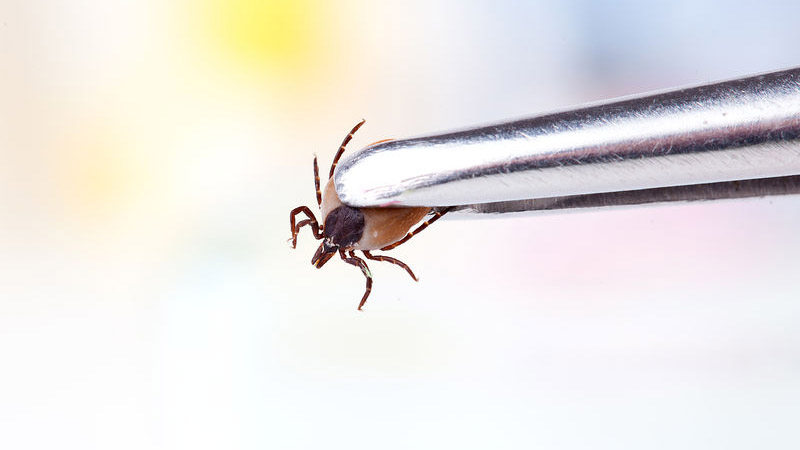Tick Tock- June is Prime Tick Season

Frank Sinatra meant it lovingly when he sang “I’ve Got You under My Skin” in 1946 but when summer breaks out, there can be something a lot less desirable getting under your skin, like a tick. Spring and summer are prime tick season and Dr. Gregory Carson, Medical Director for Shore Urgent Care in Northfield said they are currently treating patients for tick bites. He added that more rural areas such as in Ocean County are seeing more tick related patients.
According to the Center for Disease Control says ticks do not hibernate but are normally dormant in the winter months. Extended below freezing temperatures will kill off some but not all species of ticks. Information from the CDC indicates that many varieties of ticks will take shelter during the winter months in leaf debris and become quite active in the spring. They warn that while it is simple enough to come in contact with ticks while hiking or camping, many people will get bitten by a tick in their own back yard.
Dr. Carson said visits to urgent care for possible tick bites more often than not will be from the patient’s property. “Tall grass is really where the ticks like to be and they can easily attach to clothing or get on pets, people just need to be aware and to be vigilant about checking themselves and their children and pets for ticks when they come in the house,” said Dr. Carson.
Standard treatment for tick bites
When a patient comes to urgent care with the tick still on the skin it will be removed and standard procedure will put the patient on a regiment of antibiotics. Dr. Carson said often patients will come into the Shore Urgent Care Center and do not realize they have been bitten by a tick but are experiencing the symptoms of a tick related illness. Patients may be fatigued, suffering with flu-like symptoms and if they have been in an area where ticks are likely they may be tested for Lyme disease. The physician added that a blood test taken too soon after the possible tick bite can give a false negative reading so they normally wait several days before drawing a blood for Lyme disease. “Though we may wait to draw blood for Lyme disease, we do not wait to see if the traditional bull’s eye rash appears,” said Dr. Carson. “That could put them several days to several weeks behind in recovering from the bite if we waited. Our normal standard of care is that we will normally prescribe doxycycline or amoxicillin and then instruct the patient to follow up with their primary care physician.” Dr. Carson said it may take 3 to 30 days for a rash to appear.
Proper tick removal
Dr. Carson said it is very important to get the tick out from the skin. “I tell patients to use tweezers and to go as close to the edge of the skin as possible. The motion should be straight up; do not twist or jerk or it will break off, possibly leaving the head under the skin,” said Dr. Carson. “Clean the area with rubbing alcohol and never try to crush the tick.” According to Dr. Carson, if the patient wishes to have the tick evaluated for disease, they may do so by taking the tick to the County Health Department for evaluation, but he added that the tick must still be alive for the health department to test.
Brown Recluse Spiders
Ticks are not the only thing around to bug you this time of year, Dr. Carson said patients have come into Urgent Care with suspicion of being bit by a brown recluse spider. “A bite from the brown recluse spider can be pretty nasty and the patient can develop a cellulitis in the surrounding tissue. We normally will prescribe a topical cream for the affected area.” The brown recluse spider is normally found around wood piles and its bite can make a person quite sick.
CDC recommendations
The CDC suggests caution when returning to the home from a possible tick infested area, First-check clothing for ticks. Ticks may be carried into the house on clothing. Any ticks that are found should be removed. Tumble dry clothes in a dryer on high heat for 10 minutes to kill ticks on dry clothing. If clothes need laundering, hot water is recommended. Cold and medium temperature water will not kill ticks.
Next examine any gear and pets. Ticks can catch a ride into the house on anything but especially on pets so carefully examine pets, coats, and back packs. Shower soon after being outdoors. Showering within two hours of coming indoors has been shown to reduce your risk of getting Lyme disease, according to the CDC and may be effective in reducing the risk of other tick-borne diseases.
Check your body for ticks after being outdoors. Conduct a full body check upon return from potentially tick-infested areas, including your own backyard. Use a hand-held or full-length mirror to view all parts of your body. Check these parts of your body and your child’s body for ticks:
- Under the arms
- In and around the ears
- Inside belly button
- Back of the knees
- In and around the hair
- Between the legs
- Around the waist
For more information on the Shore Urgent Care Center located at 2605 Shore Road in Northfield click here.